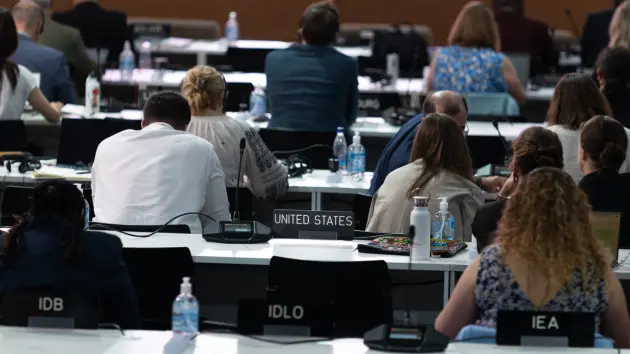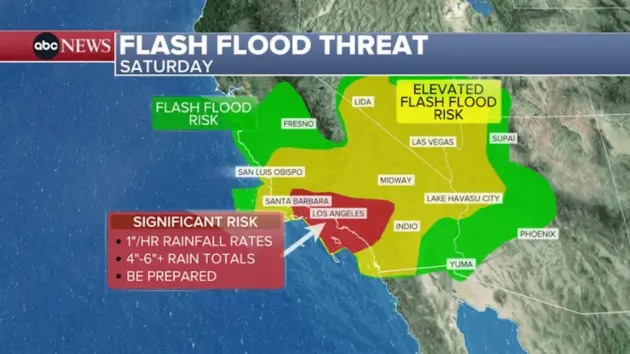
(NEW YORK) — The United States is maintaining a presence at COP30, despite the Trump administration declining to send an official delegation to the climate conference in Brazil.
This is the first time since the inaugural Conference of the Parties (COP) to the United Nations Framework Convention on Climate Change (UNFCCC) in 1995 that the U.S. will not be officially represented at the annual climate summit.
However, a large number of state and local representatives — as well as environmental nonprofits based in the U.S. — are in attendance.
A coalition of 100 local U.S. leaders — including governors, mayors and other top city and state officials — made the trip to Belem, Brazil, as part of the U.S. Climate Alliance.
California Gov. Gavin Newsom, among the notable Americans at COP30, bashed President Donald Trump for disregarding the event, which kicked off Monday.
“While Donald Trump skips the world stage, California is showing up — leading, partnering, and proving what American climate leadership looks like,” Newsom said on Tuesday.
Sen. Sheldon Whitehouse, D-RI, said in a press conference on Friday that the “Trump administration simply does not represent the American public on climate issues.”
Whitehouse, a ranking member on the Senate Environment and Public Works Committee, accused the current administration of representing the fossil fuel industry, “most particularly the big fossil fuel donors who contributed hundreds of millions of dollars to Trump’s political campaign.”
Why the U.S. did not send any delegates to COP30
The Trump administration declined to send an official delegation to COP30, according to the White House.
“The U.S. is not sending any high level representatives to COP30,” a White House official told ABC News ahead of the start of the conference. “The president is directly engaging with leaders around the world on energy issues, which you can see from the historic trade deals and peace deals that all have a significant focus on energy partnerships.”
Last week, U.S. Energy Secretary Chris Wright told The Associated Press that COP30 is “essentially a hoax.”
“It’s not an honest organization looking to better human lives,” Wright told the AP, follow a two-day business conference in Athens.
Wright added that he may attend next year’s climate conference “just to try to deliver some common sense.”
The record-breaking U.S. federal government shutdown, which ended late Wednesday, also prevented federal lawmakers from attending the conference.
Who is at COP30?
Most of the nearly 200 countries that participate in the UNFCCC attend COP.
A total of 193 countries, plus the European Union, registered a delegation for the summit. Even North Korea sent a delegation to the climate summit, according to a Carbon Brief analysis.
The only other countries not in attendance are Afghanistan, Myanmar and San Marino, with each having displayed “sporadic” attendance at past conferences, according to Carbon Brief.
Other notable U.S. politicians who made the event include Wisconsin Gov. Tony Evers, New Mexico Gov. Michelle Lujan Grisham and former Vice President Al Gore.
Several mayors of American cities are also in attendance, including Phoenix Mayor Kate Gallego, Annapolis Mayor Gavin Buckley and Savannah Mayor Van Johnson.
American cities have always been at the forefront of innovation and climate action, said Gallego, chair of Climate Mayors and C40 Cities vice chair, in a statement.
“Mayors across the country are doubling down to fill the current void of leadership at the federal level,” Gallego said.
Other notable attendees from the U.S. at COP30 this year include Taryn Finnessey, managing director of the U.S. Climate Alliance.
Why experts say it’s important that the US participates in COP30
It is integral that the U.S., as one of the world’s largest emitters of greenhouse gases, to be present at every COP, environmental advocates told ABC News.
The U.S. shapes markets, capital flows and technology pathways, and therefore engagement by Americans signals to investors that the world’s largest economy understands the competitiveness, innovation, security and supply-chain stakes of the energy transition, Maria Mendiluce, CEO of the We Mean Business Coalition, told ABC News.
“The U.S. has a decisive role in global climate, energy and industrial policy, so sub-national leaders, non-state actors and businesses showing up at COP30 matters,” Mendiluce said.
Being on the ground at COP is “essential” so delegations can engage with “full strength,” Max Frankel, director of the Sustainable Energy and Environment Coalition Institute, told ABC News.
In addition, the scope and urgency of the climate crisis demands an international response, Max Holmes, president and CEO of the Woodwell Climate Research Center, told ABC News.
It is important to let other countries know that many Americans are still working to combat climate change, Lynda Hopkins, supervisor of California’s 5th district, County of Sonoma, told ABC News.
Although the White House isn’t in Belem to represent U.S. interest, Americans at COP30 are still working for solutions that are in the best interest of the country, Fred Krupp, president of the Environmental Defense Fund, told ABC News.
“While the Trump administration retreats, the people and companies here are seizing the opportunity to innovate, create jobs, and build safer, healthier futures,” Krupp said.
Although Hopkins said she and other American subnational delegates were “warmly received” by other countries, some prominent figures at COP30 indicated that the U.S. was not needed at the conference to accomplish goals.
Christiana Figueres, a diplomat from Costa Rica who played a key role in the inception of the 2015 Paris Agreement, said the U.S. would not be able to “do their direct bullying” due to the Trump administration’s boycott of the summit.
“I actually think it is a good thing,” Figueres said during a press conference on Tuesday.
Figueres then said, “Ciao, bambino,” which translates to “Bye, little boy,” in Italian, in response to Trump withdrawing from the Paris Agreement for the second time.
Patrick Drupp, director of climate policy for the Sierra Club, described the Trump administration’s absence as “shortsighted decision” and a “slap in the face” to Americans who want clean air and water and lower energy costs.
“The reality is that this work will continue with or without America,” Frankel said.
COP30 is scheduled to run through Nov. 21.
Copyright © 2025, ABC Audio. All rights reserved.




